Korah's descendants turned a legacy of rebellion into a redemptive story of faith and contribution to the Psalms, discover how.
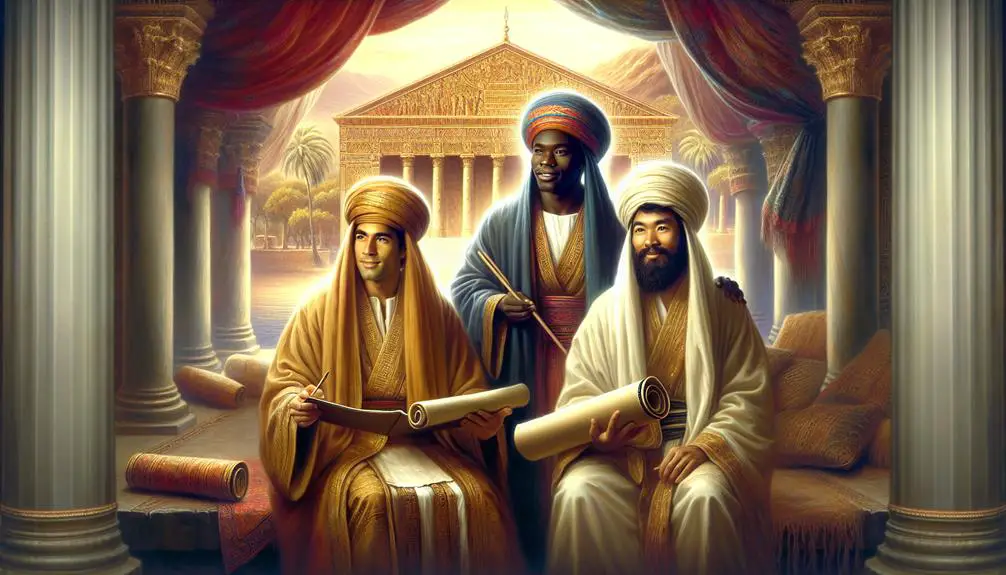
The Sons of Korah in the Bible
As the saying goes, 'Every cloud has a silver lining,' and the story of the Sons of Korah in the Bible embodies this perfectly.
You might be familiar with their ancestor's infamous rebellion against Moses, but what's truly remarkable is how they didn't let their forefather's legacy define them.
Instead, they played a pivotal role in temple worship and contributed significantly to the Psalms.
Their journey from disgrace to grace is not just a tale of redemption but also offers deep, enduring lessons on faith and identity.
Curiosity might lead you to wonder how they achieved such a transformation and what specific contributions they made.
Key Takeaways
- The Sons of Korah transformed from a lineage marked by rebellion to prominent spiritual leaders and composers.
- They played a crucial role in temple worship, enhancing it through their musical talents and compositions.
- The Psalms attributed to them are celebrated for their literary excellence and deep theological insights.
- Their story is a testament to redemption, showcasing the possibility of overcoming a troubled past to leave a lasting spiritual legacy.
Origins of Korah
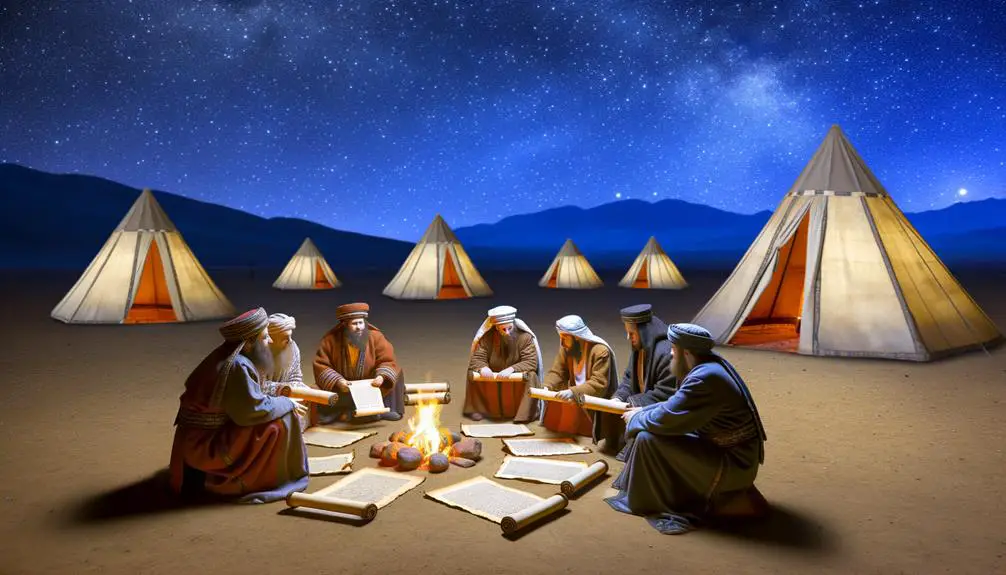
Korah's lineage, a crucial figure in biblical history, traces back to the Levites, specifically spotlighting a narrative of rebellion, consequence, and redemption that's deeply woven into the fabric of Israelite tradition. His story serves as a pivotal moment, illustrating the delicate balance between divine authority and human ambition within the community. This lineage isn't just a footnote but a significant chapter that sheds light on the complexities of leadership, loyalty, and the dire consequences of dissent against ordained leadership.
You'll find that Korah's descent isn't merely a genealogical interest but a symbolic thread highlighting the theme of desert judgment. This judgment isn't just about punitive measures but also about setting the course for future generations, teaching about the weight of actions and the importance of adhering to divine command. The desert judgment against Korah and his followers, therefore, becomes a cornerstone example of divine justice, simultaneously serving as a cautionary tale for those who'd challenge divine order.
Analyzing Korah's lineage and the desert judgment, you delve into a rich tapestry of moral and spiritual lessons. It's a narrative that compels one to reflect on the nature of authority, the consequences of rebellion, and the possibility of redemption. The story of Korah, therefore, isn't just an historical recount; it's a profound exploration of the dynamics within a community chosen to uphold a divine covenant, emphasizing the need for unity, respect for leadership, and the perilous path of challenging divine decree without righteous cause.
The Rebellion's Legacy
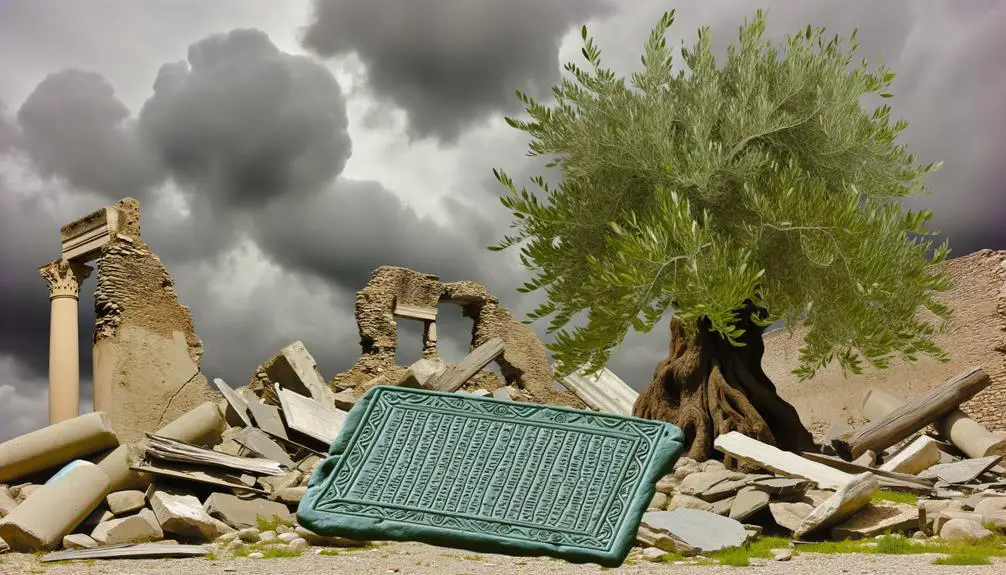
Reflecting on the narrative of Korah's defiance, it's imperative to explore how this event irrevocably shaped the legacy of his descendants and the broader Israelite community. The rebellion against Moses and Aaron, met with divine judgment, serves as a pivotal moment, highlighting the intricate relationship between familial loyalty and divine decree. Here's how this significant event influenced the future:
- Survival of the Sons: Despite the severe consequences faced by Korah and his co-conspirators, the survival of his sons presents a compelling narrative of mercy and redemption within divine judgment. This outcome underscores the notion that individual choices, rather than familial ties, determine one's fate in the eyes of the divine.
- Transformation of Identity: The descendants of Korah underwent a remarkable transformation, evolving from the lineage of a rebel to esteemed contributors to the Israelite religious life. This shift illustrates the potential for redemption and the importance of personal merit over inherited guilt, fostering a culture of responsibility and renewal.
- Legacy of Service: The legacy left by Korah's rebellion, paradoxically, became one of service and devotion rather than rebellion. This outcome emphasizes the dynamic nature of legacy, where past transgressions can give way to future contributions, highlighting the complex interplay between divine judgment and the path to redemption.
In dissecting the aftermath of Korah's rebellion, it's clear that the event not only served as a cautionary tale against dissent but also paved the way for a legacy characterized by service, resilience, and a profound understanding of divine judgment and familial loyalty.
The Role in Temple Worship
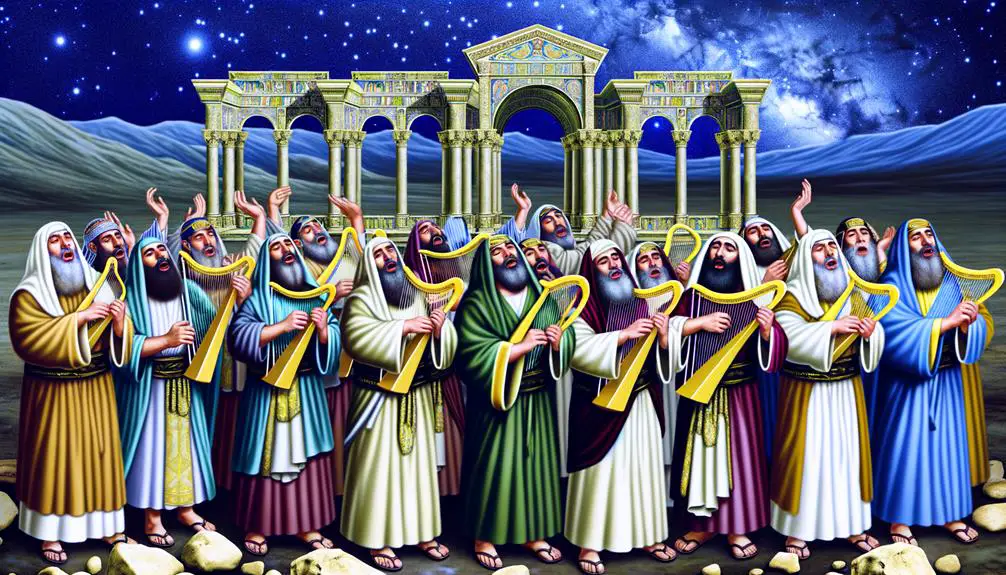
You'll find that the Sons of Korah played a pivotal role in temple worship, contributing significantly through their musical talents, leadership in worship, and the composition of Psalms.
Their expertise in music and liturgy not only enriched the spiritual atmosphere but also influenced the development of Hebrew poetry and worship practices.
This integration of art and faith underscored their unique contribution to the religious life of ancient Israel.
Musical Contributions
The Sons of Korah significantly shaped temple worship through their profound contributions to its musical landscape. Their mastery in instrument techniques showcased unparalleled skill, elevating the musical experience in temple services.
Lyric origins traced back to profound theological and historical depths, enriching the worship with layers of meaning.
Harmonic arrangements that blended voices and instruments in ways previously unheard of in the temple precincts.
This trio of contributions not only enhanced the aesthetic and spiritual atmosphere of worship but also set a precedent for liturgical music.
Worship Leadership Roles
Building on their musical mastery, the Sons of Korah also played pivotal roles in leading temple worship, guiding congregants through rituals with profound spiritual insight. Their influence on worship innovations and leadership dynamics cannot be overstated. They were not just musicians; they were spiritual leaders who shaped the temple worship experience in significant ways.
Role in Temple Worship |
Impact on Worship Innovations |
Leadership Dynamics |
|---|---|---|
Musical Leadership |
Introduced new psalms |
Collaborative |
Ritual Guidance |
Enhanced liturgical practices |
Directive |
Prayer Leadership |
Deepened prayer experiences |
Inspirational |
Teaching |
Expanded theological insights |
Educational |
Their contributions went beyond performance, embedding deeper meaning into the rituals and connecting the congregation with the divine. The Sons of Korah's legacy in temple worship is a testament to their spiritual and musical prowess, forever changing the dynamics of worship leadership.
Psalms Composition Influence
Among their most enduring contributions, the Sons of Korah's authorship of numerous psalms significantly shaped temple worship, embedding a rich theological depth into the liturgical fabric. Through literary analysis and thematic exploration, you'll uncover how:
- Literary Excellence – Their psalms showcase sophisticated poetic structures, enhancing worship with artistic beauty.
- Emotional Resonance – They masterfully express a wide range of human emotions, from despair to joy, fostering a deep, empathetic connection with worshippers.
- Theological Depth – Their works delve into complex theological themes, inviting worshippers into a profound contemplation of God's nature and deeds.
This multifaceted influence ensured that temple worship wasn't only a ritualistic practice but a dynamic, engaging, and spiritually enriching experience.
Contributions to the Psalms

Several of the Psalms are attributed to the Sons of Korah, showcasing their significant contribution to this sacred anthology. Their involvement sparks authorship debates, underscoring the complexity and diversity within the Psalms' literary styles. The Psalms of Korah stand out for their distinctive voice and thematic focus, differentiating them from those attributed to David or Asaph. You'll find these Psalms deeply immersed in themes of divine protection, guidance, and the beauty of God's dwelling place. Their literary style often reflects a communal perspective, emphasizing collective worship and the experience of the community in seeking God's favor and presence.
Analyzing the contributions of the Sons of Korah, you'll notice a nuanced approach to expressing faith and distress. Their Psalms don't just lament or praise; they weave a complex tapestry of human emotion and divine interaction. This unique approach has fueled debates over their exact role in the composition and preservation of these texts. Some scholars argue that the Sons of Korah were more than mere scribes or musicians; they were theologians in their own right, contributing significantly to the development of Jewish worship and understanding of God.
Their Psalms often exhibit a rich use of metaphor and imagery, drawing on natural landscapes to describe spiritual realities. This literary style not only enhances the aesthetic appeal of the Psalms but also deepens the theological insights contained within them. Through their contributions, the Sons of Korah have left an indelible mark on the Psalter, enriching the tapestry of biblical literature with their unique perspectives and literary genius.
Key Figures Among the Descendants
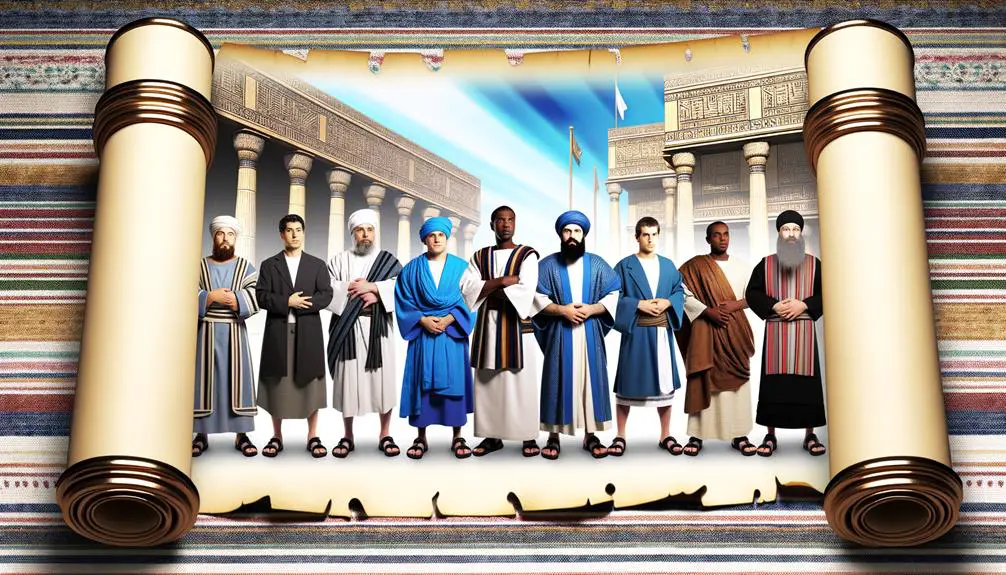
Delving into the lineage of the Sons of Korah, we uncover key figures whose contributions further shaped the spiritual and cultural landscape of their time. Their stories, embedded within the fabric of biblical narrative, illustrate the genealogical significance and historical context of this unique lineage.
Here are three pivotal characters:
- Heman the Ezrahite: As a notable descendant, Heman's role as a singer and a chief musician during King David's reign highlights the evolving spiritual contributions of the Korahites. His leadership in worship, documented in 1 Chronicles 6:33, underscores the enduring legacy of Korah's descendants in shaping Israelite worship practices.
- Samuel: Although not directly named as a Son of Korah, genealogical clues suggest Samuel's connection to this lineage, as outlined in 1 Chronicles 6. Samuel's pivotal role as prophet, judge, and anointer of kings bridges the tribal and monarchic periods of Israel, emphasizing the genealogical significance and historical context of the Korahites within biblical narratives.
- Asaph: A contemporary of David, Asaph's contributions as a psalmist and musician underscore the artistic and spiritual legacy of the Korahites. His role in establishing musical traditions within the temple worship (1 Chronicles 6:39) further cements the historical and cultural impact of the Sons of Korah.
These figures, among others, fortify the narrative of the Korahites' enduring influence. Their stories, interwoven with Israel's history, underscore the genealogical significance and historical context of this lineage, offering insights into the multifaceted roles they played within their societal framework.
Their Symbolic Redemption

The symbolic redemption of the Sons of Korah, deeply embedded in their narrative, illustrates a profound transformation from their ancestor's rebellion to a legacy of spiritual leadership and worship within the Israelite community. This shift isn't simply a historical footnote; it serves as a grace metaphor, embodying the idea that even those with a tumultuous past can find a place of honor and service in God's plan. Their journey from the brink of eradication due to Korah's defiance against Moses to their eventual role as custodians of sacred songs is a redemption narrative that resonates deeply with themes of forgiveness and restoration.
You see, their story isn't just about survival; it's about how grace reshapes destiny. The Sons of Korah didn't merely escape the fate of their forefather; they embraced a mission that turned their family name from a symbol of rebellion into one of worship and praise. This transformation is meticulously documented through their contributions to the Psalms, where they channel their turbulent history into expressions of faith, hope, and love.
This redemption narrative highlights a pivotal message: past mistakes don't define the future. The Sons of Korah's ability to rise above their ancestry and contribute profoundly to the spiritual life of Israel exemplifies how redemption and grace can forge a new path, even from the depths of despair. Their story, rich with themes of renewal and second chances, serves as a powerful testament to the transformative power of faith and forgiveness.
Enduring Lessons for Faith

You'll find that the story of the Sons of Korah stands as a testament to resilience against adversity, showcasing how faith can persevere through the most challenging times.
Their legacy of worship, deeply embedded in the Psalms, offers a blueprint for maintaining a spiritual connection amidst trials.
This narrative underscores the importance of holding onto faith and the transformative power of worship in navigating life's hurdles.
Resilience Against Adversity
Exploring the resilience of the Sons of Korah against adversity offers profound insights into enduring faith amidst trials. Their story illuminates:
- Modern parallels in how individuals today face and overcome challenges, reflecting the timeless nature of their perseverance.
- The importance of community support in navigating through tough times, mirroring the collective strength the Sons of Korah found in their faith and each other.
- The transformative power of adversity, which not only tests but also strengthens faith, much like the trials faced by the Sons of Korah served to fortify their commitment to their beliefs.
Analyzing their journey reveals that resilience isn't just about surviving; it's about thriving by using challenges as catalysts for growth and deepening faith.
Legacy of Worship
Turning our focus to the enduring legacy of worship established by the Sons of Korah, we uncover essential lessons for deepening faith in contemporary spiritual practices. Their story teaches us about the importance of worship evolution and faithful continuity.
Aspect |
Significance in Worship |
Contemporary Application |
|---|---|---|
Authenticity |
Root of genuine worship |
Be true in your devotion |
Community |
Strengthens faith |
Engage in collective worship |
Adaptability |
Worship evolves |
Embrace new forms of praise |
Remembrance |
Honors past faithfulness |
Reflect on historical faith |
These pillars, established by the Sons of Korah, guide you in nurturing a worship practice that's both rich in tradition and adaptable to modern expressions of faith, ensuring a vibrant, enduring spiritual journey.
Frequently Asked Questions
How Has the Story of the Sons of Korah Influenced Modern Christian Music and Worship Practices?
The story you're asking about has significantly influenced modern Christian music and worship practices. Through Korah's lineage, the tradition of incorporating Musical Psalms into worship has been deeply rooted. These psalms, attributed to their descendants, showcase a profound legacy of faith and repentance, inspiring contemporary worship songs and arrangements.
This connection highlights how ancient narratives continue to shape and enrich the spiritual and musical dimensions of modern Christian worship, offering depth and continuity.
Are There Any Archaeological Findings That Directly Link to the Sons of Korah or Their Historical Context?
You're probably wondering if there are any archaeological findings linked to Korah's lineage. While archaeological methods have advanced, directly connecting artifacts to specific biblical figures like the Sons of Korah remains challenging.
Despite extensive digs and research, evidence specifically pointing to Korah's descendants is scarce. Most findings provide a broader understanding of the period's culture and society rather than direct links to individuals or specific biblical narratives.
How Has Jewish Rabbinical Interpretation of the Sons of Korah Evolved Over the Centuries?
Imagine you're unraveling a complex, ancient tapestry, where each thread represents a piece of Korah's genealogy. Over centuries, Jewish rabbinical interpretation of these threads has evolved significantly.
Rabbinical debates have woven new patterns, deeply analyzing and reinterpreting Korah's legacy. This analytical journey through texts and traditions has enriched understanding, revealing how interpretations have shifted, reflecting broader changes in thought and society.
Your grasp of this evolution shows a keen insight into religious and historical scholarship.
In What Ways Do Contemporary Theologians Reconcile the Harsh Judgment of Korah's Rebellion With Modern Understandings of Mercy and Forgiveness?
You're exploring how contemporary theologians tackle reconciling divine justice with modern views on mercy and forgiveness, especially in harsh biblical narratives.
They delve into moral evolution, suggesting that our understanding of divine justice must adapt as society's moral compass evolves.
This approach allows for a compassionate reinterpretation of traditional texts, emphasizing that lessons from the past can guide us toward a more forgiving and inclusive understanding of divine justice today.
Can the Influence of the Sons of Korah Be Traced in Other Religious Traditions Outside of Judaism and Christianity?
You'll find it fascinating that in some interfaith dialogues, Korah's legacy is a point of contention and curiosity. While directly tracing his influence outside Judaism and Christianity is challenging, the themes of rebellion and divine judgment he embodies resonate in various religious narratives.
This suggests a nuanced understanding of Korah's story might enrich discussions on authority and mercy across traditions, even if explicit references in other religions are scarce.
Conclusion
In the tapestry of biblical history, the Sons of Korah stand out as vibrant threads, symbolizing resilience and redemption. Despite their ancestor's rebellion, they soared, contributing significantly to temple worship and the Psalms.
Like a phoenix rising from ashes, they illustrate that one's legacy isn't chained to past mistakes. Their story teaches us the power of transformation and the enduring grace that allows for new beginnings, serving as a profound reminder of faith's ability to evolve and redeem.

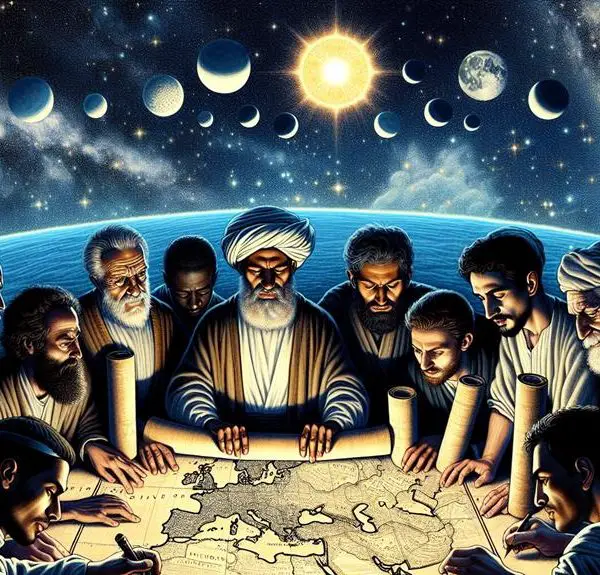

Sign up